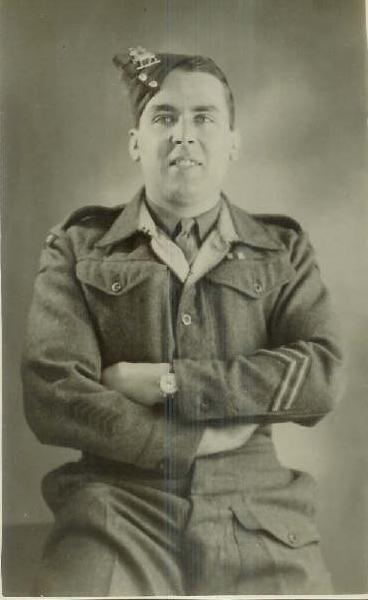 |
Death March - Jack’s story
Jack will always be remembered as a bit of a Jack-the-Lad, a very positive, fun-loving, caring and joking Grandfather. He didn’t always have it easy in his life however, and it still amazes me that considering what he went through, his later years were full of fun and laughter. Jack’s story is in no way special, unique or more extreme compared to anyone of his generation – they all experienced the horrors of World War II in some shape or form but this is his story. In 1940 Jack was sent over to France as part of the British Expeditionary Force to help the French repel the invading German army. Poorly equipped and with very little training or ammunition, they were no match for the German tank division they encountered. He was taken as a Prisoner of War and sent to Poland to work in labour camps at the age of 20. He spent what was in effect the prime years of his life incarcerated and forced to work a series of horrendous jobs in terrible conditions without enough food to support life. It was only as a result of the British Red Cross that people like Jack survived as it was their food parcels that supplemented the inadequate watery potato soup that gave them enough calories to survive. After 4 years the War was coming to an end. The Allies were making advances eastward in France, Italy and Holland and the Russians were pushing westward. In a last desperate act, Hitler ordered the Germans home to defend the Motherland which led to the very rushed, unplanned and ill-prepared retreat of all Germans and their prisoners back to Germany.
|
|||||
Forced to march by the German prison guards who could hear the advancing Russian guns, they were told to get up, grab whatever they had and start walking. Malnourished from 4 years of near starvation and weak from the effects of the hard labour they were provided with just a loaf of bread, a small portion of margarine and artificial honey. For the next 3 months and 700 miles they had to scavenge, steal but more often, starved. Depending on which unofficial report or estimate you read, up to two-thirds of the prisoners didn’t survive, hence it became known as the ‘Death March’. Only the strongest survived, stragglers were shot, those that fell down exhausted were clubbed to death or left to die. Many also died of the extreme cold as they marched through the winter of 1945, the harshest winter on record Europe has ever experienced.
Jack rarely spoke of the misery and hardship that he endured as a POW and never to my knowledge spoke about the Death March. It is only since his death in 2005 that we have looked into this more closely. He did however speak about the British Red Cross and Salvation Army and he continued to support them throughout his life. Many soldiers like Jack understood that if it wasn’t for the food parcels many more thousands of soldiers would not have made it home. And the British Red Cross continue to do an amazing job today so please support them; www.justgiving.com/Denyer Liberation The text below closely matches the story Jack told us about his liberation, especially the bit about the doughnut van! It is taken from a book called “The Last Escape; The untold story of Allied prisoners of war in German 1944-45”
“A fierce battle raged. SS troops were dug in down by the river and along the railway embankment a mile away and ready to defend the town of Moosburg. In the camp, prisoners scrambled for safety, hugging or diving for any scrap of cover they could find as bullets flew through the air. Suddenly the firing stopped and, cautiously, men began to make their way out into the compound. Those brave enough climbed upon the roofs of their barracks, and from there they could see a column of tanks on a hill in the distance. As these got closer, their shape showed they were Shermans. The American star stencilled on the side confirmed it. Men screamed and yelled. It was General Patton himself, looking like a cowboy with his pearl six-shooters strapped to his sides. His jeep came to a stop just outside the barbed-wire fence and we just knew this was liberation. It was like visiting heaven. He was immediately surrounded by hundreds of thin, grateful, and home-sick young men. The senior Allied officer made his way to the jeep and stood before the General. He snapped a sharp salute. The General stood tall and returned the salute with the words ‘It is we who salute you and all these brave men’. Then some trucks arrived in the camp with food and water – and doughnuts for the Americans, served by two blonde girls from a lorry. Over in the British compound, the mood was calmer...we British prisoners were mostly quiet, only slowly and hesitantly allowing ourselves to smile in a bewildered sort of manner. We were nearly all old kriegies (short for Kriegesgefangenen which is the German word for prisoner of war) of many years standing and we watched while the Americans and all the younger ones went wild with unrestrained excitement. Later we celebrated quietly on our own by having a peaceful brew of tea out in the sun." |
||||||
.jpg.opt502x367o0,0s502x367.jpg)
.jpg.opt314x367o0,0s314x367.jpg)